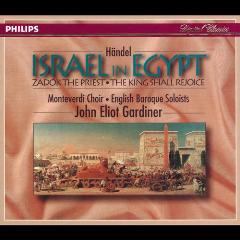George Frideric Handel - Israel in Egypt (Gardiner) [1992]
George Frideric Handel - Israel in Egypt (Gardiner) [1992]

1. Ov: Lamentations of the Israelites for the death of Joseph - Gardiner/Monteverdi Orch 2. 1. Now here arose - P. Elliott 3. 2. And the children of Isreal sighed by reason of the bondage: And their cry... - C. Royall/Monteveri Chor 4. 3. Then he sent Moses - P. Elliott 5. 4. They loathed to drink 6. 5. Thier land brought - A. Stafford 7. 6. He spake the word 8. 7. He gave them hailstones 9. 8. He sent a thick darkness 10. 9. He smote all the first-born 11. 10. But as for His people 12. 11. Egypt was glad 13. 12. He rubuked the Red Sea 14. 13. He led them 15. 14. But the waters 16. 15. And Isreal saw 17. 16. And believed the Lord 18. 17. Moses & the children 19. 18. I will sing 20. 19. The Lord is my strength - J. Knibbs/M. Troth 21. 20. He is my God 22. 21. I will exault him 23. 22. The Lord is a man of war - S. Varcoe/C. Stewart 24. 23. The depths have covered them 25. 24. Thy right hand 26. 25. And in the greatness 27. 26. Thou sentest forth 28. 27. ANd with the blast 29. 28. The enemy said - W. Kendall 30. 29. Thou didst blow - D. Greene 31. 30. Who is like unto Thee 32. 31. The earth swallowed them 33. 32. Thou is thy mercy - B. Gordon/P. Elliott 34. 33. The people shall hear 35. 34. Thou shalt bring - J. Clarkson 36. 35. The Lord shall reign 37. 36. For the horse of Pharoah - P. Elliott 38. 37. The Lord shall reign 39. 38. And Miriam the prophetess - P. Elliott 40. 39. Sing ye to the Lord, for he hath triumphed gloriously!/The Lord shall reign... - E. Priday/Monterverdi Chor Charles Brett - Counter Tenor Norma Burrowes - Soprano J. Clarkson - Counter Tenor Paul Elliott - Tenor B. Gordon - Counter Tenor D. Greene - Soprano Malcolm Hicks Organ Martyn Hill - Tenor William Kendall - Tenor Jean Knibbs - Soprano M. Lewin - Theorbo Elisabeth Priday - Soprano Alistair Ross - Harpsichord Christopher Royall - Counter Tenor Marilyn Sansom - Cello Ashley Stafford - Counter Tenor Charles Stewart - Bass Maryilyn Troth - Soprano Stephen Varcoe - Bass Monteverdi Choir Monteverdi-Orchester München John Eliot Gardiner - Conductor
The music of George Frideric Handel has accompanied John Eliot Gardiner throughout his career. Many operas, oratorios and other vocal works as well as music for orchestra have been recorded by him since the 1970s. Warner Classics has reissued some of these in this box. It is a strangely mixed package, which seems to be put together haphazardly. What is the connection between the Concerti grossi opus 3 and the vocal items? It seems to me a rather unhappy decision to put together recordings which are stylistically so different: the concerti grossi are played on period instruments, whereas the vocal items are performed with the Monteverdi Orchestra, which uses modern instruments.
A box with the vocal items only would have made much more sense, as in all of them the choir plays the main role. The fact that the oratorio Israel in Egypt mainly consists of choruses was one of the reasons the first performance in 1739 failed to captivate audiences. Originally it was written in three parts, but for the second performance Handel dropped the first part. It is the revised two-part version which is most often recorded nowadays, and that is how it is performed here.
The first part is very dramatic in its vivid description of the exodus of the Jews from Egypt. The texts are mainly from the book of Exodus as well as Psalms 105 and 106. In the orchestral parts Handel illustrates the plagues which afflict the Egyptian people. The second part, Moses' song, is a setting of the song Moses wrote and sang after he had led his people through the Red Sea and after the Egyptian army had been swallowed up by the waters.
I wonder if John Eliot Gardiner would be very happy with the reissue of his recording of Israel in Egypt, in particular since he has recorded it again later with the English Baroque Soloists on period instruments. It has to be said, though, that the use of modern instruments in his first recording is not the main problem. It is rather the lack of drama which makes it difficult to see how this performance could compete with more recent recordings. Some choruses are done pretty well, but others are tame, and the illustration of the plagues in the instrumental parts is seldom fully explored by the orchestra. Among the soloists only the tenors and basses are worth listening to. The sopranos are weak and produce an old-fashioned wobble, whereas the altos are too colourless.
The original first part of Israel in Egypt, 'The Lamentation of the Israelites for the death of Joseph', was an adaptation of the Funeral Anthem for Queen Caroline, 'The Ways of Zion do mourn', which Handel composed in 1737. This is a lament on the death of Queen Caroline on texts from the Bible, in particular the book of Job and the Lamentations of Jeremiah. ---Johan van Veen, www.musicweb-international.com
download: uploaded anonfiles yandex 4shared solidfiles mediafire mega filecloudio nornar








